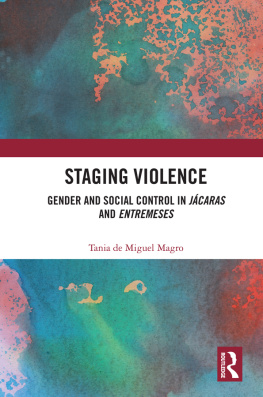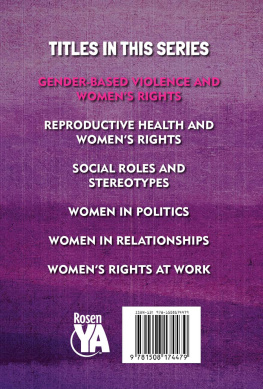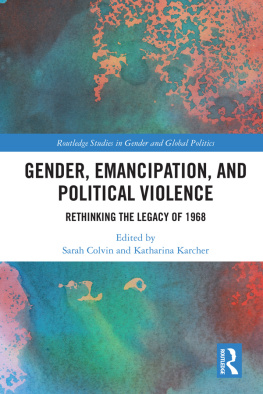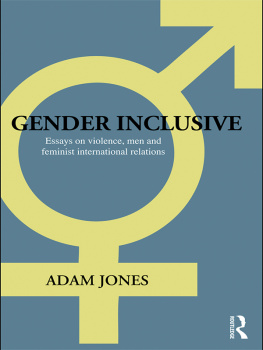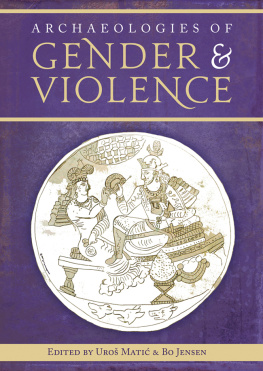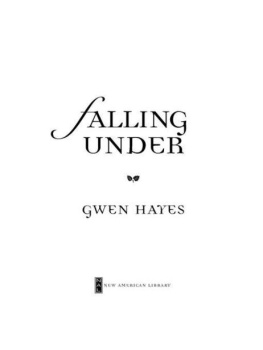
Gender Violence in Ecofeminist Perspective
This book aims to begin an eco-centered, eco-feminist informed discussion about the ways in which our relationship to nature is bound up with gender, patriarchy, and violence.
Ecofeminist scholars study the interconnections between gendered relationships of domination among humans, between humans, and between humans, nonhumans, and the earth. It is in this ideological and structural tangle between humans and the environment that a deeper understanding of gender violence is possible. Ecofeminism offers analytical possibilities for understanding a logic of domination which sustain a whole host of problems, including the interrelated oppressions of gender violence and exploitation of the more-than-human-life world. In this book, Gwen Hunnicutt brings into dialog ecofeminism and gender violence. Ideological components, such as speciesism and the belief that the earth and its nonhuman inhabitants are ours to exploit, inform a host of other social practices, including interpersonal violence.
A portion of this book is devoted to exploring the ways in which patriarchy is foregrounded by another hierarchyhuman domination over nature. Thus, gender violence stems from a logic of domination that is built on the domination of nature and the domination of the Other as nature. As this blueprint of oppression repeats itself where there are vectors of difference, the chapters ultimately connect these oppressions by showing the inextricable bind of violence against humans and the more-than-human-life world. This book will serve as a resource for scholars, activists, and students in sociology, gender violence and interdisciplinary violence studies, critical animal studies, environmental studies, and feminist and ecofeminist studies.
Gwen Hunnicutt is an Associate Professor of Sociology at the University of North Carolina Greensboro. Professor Hunnicutt received her PhD from the University of New Mexico and studies various dimensions of gender violence. Her writings have appeared in various journals, including Sexuality and Culture, Violence Against Women, Gender Issues, Journal of Family Violence, and Journal of International Womens Studies.
Routledge Research in Gender and Society
76 Mexican American Women, Dress and Gender
Pachucas, Chicanas, Cholas
Amaia Ibarraran-Bigalondo
77 Trauma, Womens Mental Health, and Social Justice
Pitfalls and Possibilities
Emma Tseris
78 Wellness in Whiteness
Biomedicalisation and the Promotion of Whiteness and Youth among Women
Amina Mire
79 Contemporary Muslim Girlhoods in India
A Study of Social Justice, Identity and Agency in Assam
Saba Hussain
80 White Masculinity in Contemporary Australia
The Good Ol Aussie Bloke
Andrea Waling
81 Motherhood in Contemporary International Perspective
Continuity and Change
Edited by Fabienne Portier-Le Cocq
82 Gender Violence in Ecofeminist Perspective
Intersections of Animal Oppression, Patriarchy and Domination of the Earth
Gwen Hunnicutt
For more information about this series, please visit: https://www.routledge.com/sociology/series/SE0271
Gender Violence in Ecofeminist Perspective
Intersections of Animal Oppression, Patriarchy and Domination of the Earth
Gwen Hunnicutt
First published 2020
by Routledge
2 Park Square, Milton Park, Abingdon, Oxon OX14 4RN
and by Routledge
52 Vanderbilt Avenue, New York, NY 10017
Routledge is an imprint of the Taylor & Francis Group, an informa business
2020 Gwen Hunnicutt
The right of Gwen Hunnicutt to be identified as author of this work has been asserted by him/her/them in accordance with sections 77 and 78 of the Copyright, Designs and Patents Act 1988.
All rights reserved. No part of this book may be reprinted or reproduced or utilised in any form or by any electronic, mechanical, or other means, now known or hereafter invented, including photocopying and recording, or in any information storage or retrieval system, without permission in writing from the publishers.
Trademark notice: Product or corporate names may be trademarks or registered trademarks, and are used only for identification and explanation without intent to infringe.
British Library Cataloguing-in-Publication Data
A catalogue record for this book is available from the British Library
Library of Congress Cataloging-in-Publication Data
Names: Hunnicutt, Gwen, author.
Title: Gender violence in ecofeminist perspective : intersections of animal oppression, patriarchy and domination of the earth / Gwen Hunnicutt.
Description: Abingdon, Oxon ; New York, NY : Routledge, 2020. | Series: Routledge research in gender and society | Includes bibliographical references and index.
Identifiers: LCCN 2019030473 (print) | LCCN 2019030474 (ebook)
Subjects: LCSH: Ecofeminism. | Violence. | Speciesism. | Patriarchy. | Human ecology.
Classification: LCC HQ1194 .H86 2020 (print) | LCC HQ1194 (ebook) | DDC 304.2082dc23
LC record available at https://lccn.loc.gov/2019030473
LC ebook record available at https://lccn.loc.gov/2019030474
ISBN: 978-1-138-49384-1 (hbk)
ISBN: 978-1-351-02622-2 (ebk)
Typeset in Times New Roman
by codeMantra
To all nonhuman animals in captivity
Because environmental crises related to climate change will eventually impact every area of social life, all scholars will need to heed environmental concerns. The other-than-human-life world is often rendered invisible in descriptions and explanations of social life. In the age of the Anthropocene, scholarship of all kinds will need to illuminate the connectedness between human behavior and our relationship to the ambient natural environment. In the next 50 years, we will see the worlds population increase beyond nine billion, watch green spaces and species disappear, and witness large-scale human suffering. What does it mean to be a scholarin any fieldat the dawn of global ecological crisis? I endeavor here to reach many audiences: sociologists, gender violence researchers, environmentalists, feminists, ecofeminists, and the non-academic public. This book is also written for anyone who wants to heal the earth and heal our bodies, and to protect the earth, nonhuman animals, and people from violence. This book is for those who are open to the idea that violent behavior, which always manifests in gender-specific ways, is an outgrowth of our relationship with the earth/nature/environment.
In these pages, I attempt to open an eco-centered, eco-feminist informed exploration of connections between humans relationship to nature, gender, patriarchy, and violence. Ecofeminist scholars study the interconnections between gendered relationships of domination among humans, between humans, and between humans, nonhumans, and the earth. It is in this ideological and structural tangle between humans and the environment that a deeper understanding of gender violence is possible. Ecofeminism offers analytical possibilities for understanding a logic of domination which sustain a whole host of problems, including the interrelated oppressions of gender violence and exploitation of the more-than-human-life world. My goal with this project is to bring into dialog ecofeminism and gender violence, which takes as a starting point ontological dualisms of devaluing the Other and a contingency between a gendered environment and gendered bodies. Ideological components, such as speciesism and the belief that the earth and its nonhuman inhabitants are ours to exploit, inform a host of other social practices, including interpersonal violence.




